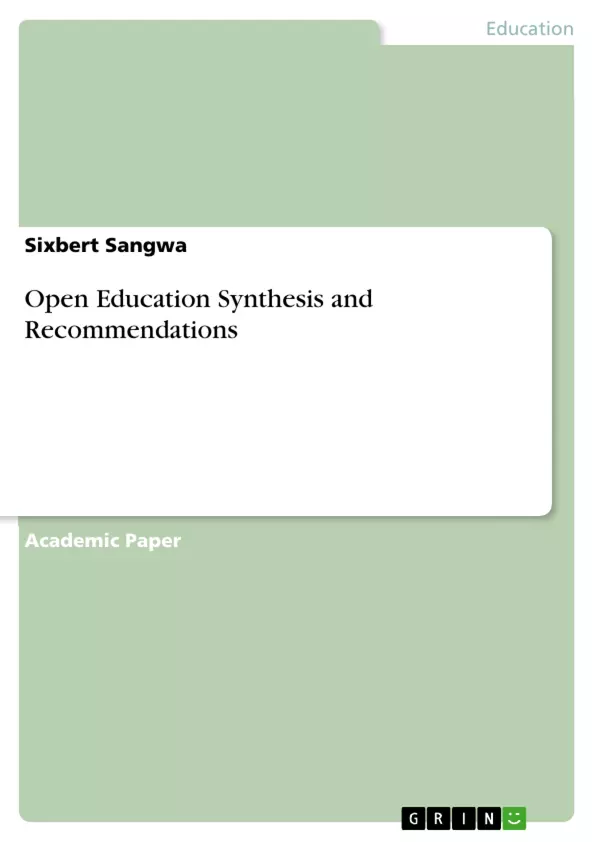This short report is intended for the management team of a traditional Rwandan university, which has recently heard about open education and wants to develop a strategy on it. As the management team has little experience in open education, a briefing documentation about open education was given for their consideration. Although this is not a fully costed business proposal, it makes recommendations for open pathways, suggests a strategy for OER production, suggests engagement with other initiatives, and proposes a cautious approach or any mixture deemed appropriate.
The report provides an overview of the domain, listing referenced searches in the academic domain as well as current researches and developments in the domain. It presents various proposals on the production, use and publication of Open Educational Resources (OER) and provides guidelines for the practice of learning and teaching in order to improve the quality of the student experience, to improve the provision of learning opportunities for all and to improve pedagogical practices. It also recognizes that the use, creation and publication of OER should be consistent with the university's mission and overall goals. Finally, the report highlights the main benefits for the University of adopting an open education policy, suggests a strategy for the production of OER, engagement with other initiatives, propose a cautious approach or constitute a mixture deemed appropriate. It outlines the main associated risks, proposes strategies to overcome them, and exposes the required technologies, including new roles and responsibilities to apply this new policy in academic institutions. It just provides hands-on experience, guidance and recommendations for the university to consider while developing an open education policy strategy.
Inhaltsverzeichnis (Table of Contents)
- Introduction and Background
- Context Discussions
- Background and Overview of the Area
- Open Education Policy Recommendations
- Exploration
- Installation
- Initial implementation
- Full implementation recommendations
- Policy Sustainability Guidance
- Benefits
- Risks
- Resources
- Conclusion
Zielsetzung und Themenschwerpunkte (Objectives and Key Themes)
This report aims to provide a comprehensive overview of open education and its potential implications for a traditional Rwandan university. It seeks to guide the university management team in developing a strategy for incorporating open education practices into their existing programs and courses. The report also identifies key benefits and risks associated with adopting an open education policy and proposes strategies to mitigate potential challenges.
- Open Educational Resources (OER) and their role in enhancing teaching and learning
- The impact of open education policies on access, quality, and equity in education
- Strategies for promoting the creation, use, and publication of OER within a university setting
- Considerations for the sustainable implementation of open education practices
- The role of technology and digital resources in supporting open education initiatives
Zusammenfassung der Kapitel (Chapter Summaries)
- Introduction and Background: This chapter introduces the concept of open education and its historical context, highlighting the shift towards a more open and collaborative approach to knowledge sharing. It also discusses the growing availability of open educational resources (OER) and their potential benefits for educators and learners.
- Open Education Policy Recommendations: This chapter presents a detailed strategy for adopting an open education policy within a university setting. It outlines key stages in the implementation process, from initial exploration and installation to full implementation and sustainability.
- Benefits: This chapter explores the numerous benefits of adopting an open education policy, focusing on its potential to enhance access to quality education, improve pedagogical practices, and foster a more inclusive learning environment.
- Risks: This chapter discusses potential challenges and risks associated with open education, including issues related to intellectual property, quality assurance, and the need for ongoing support and training.
- Resources: This chapter provides a list of valuable resources and tools that can support the implementation of an open education policy, including links to open educational repositories, licensing information, and best practices.
Schlüsselwörter (Keywords)
The main keywords and focus topics of this report are: Open Educational Resources (OER), Open Educational Policy, Open Access, Open Licensing, Open Source Software, Massive Open Online Courses (MOOCs), Online and Distance Learning, Digital Resources, Pedagogical Practices, and Educational Equity.
- Citation du texte
- Dr. Sixbert Sangwa (Auteur), 2019, Open Education Synthesis and Recommendations, Munich, GRIN Verlag, https://www.grin.com/document/1012794



